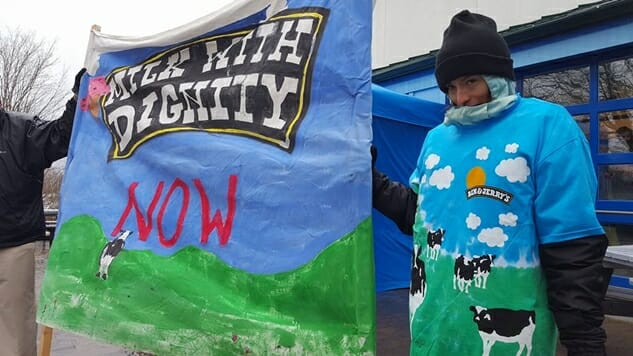Free Cones from Ben & Jerry’s May Come with an Unseen Cost
Photo by Will Lambek
Somewhere at a Ben & Jerry’s yesterday, an eager ice cream enthusiast ordered the popular Americone Dream, a taste bud experience the company jokingly promotes as “it may be illegal to lick the Lincoln Memorial, but with this ice cream, you can do the next best thing and lick liberty.” The duly named Vanilla Ice Cream with Fudge Covered Waffle Cone Pieces and Caramel Swirl may have hit a nerve for dairy workers who also wish to pursue the eponymous American Dream.
Almost a million people lined up at Ben and Jerry’s Scoop shops around the world for their 38th Free Cone day. That’s one million (because let’s be honest, how many college kids get back in line for seconds) scoops of ice cream.
We can’t contain ourselves, so excited that #FreeConeDay is finally here! pic.twitter.com/KFH7E9lbaD
— Ben & Jerry’s (@benandjerrys) April 4, 2017
But as lines grew around blocks, and people posted selfies to #FreeConeDay, activists in a handful of U.S. cities were protesting the company with human and labor right demands. A campaign dubbed the “Milk with Dignity Campaign,” is run by dairy workers and activists organizing with immigrant rights group Migrant Justice in Burlington, VT.
They allege that some dairy farms in Ben & Jerry’s milk supply chain are paying wages below the VT minimum wage of $10.00 per hour, along with 20 percent of Vermont dairy workers having 20 percent of their pay illegally withheld.
Kike Balcazar, 24, is an immigrant who worked on Vermont dairy farms for three years. His parents have also been dairy workers for more than ten years. He spoke at the Waterbury and Burlington protests on Free Cone Day, and said, “It would be best if no one has to work in the conditions we have worked in. I worked from three in the morning until noon and again in the evening. Often we didn’t have even eight consecutive hours to sleep.” Balcazar is currently an organizer with Migrant Justice, and was recently released from temporary detention by U.S. Immigration and Customs Enforcement after being picked up with other organizers for what the organization claims is a target by immigration authorities on political and social activism.
Dairy Farm Worker Enrique Balcazar. Photo by Will Lambek
A 2014 survey of 200 Vermont dairy workers revealed the average worker works 60-80 hours a week, 28 percent routinely work seven hours or more without a break to eat, 40 percent have no time off, and in a state where winters are long and arduous, 15 percent live in overcrowded housing with inadequate heat. According to Migrant Justice, there are between 1,200 to 1,500 immigrant dairy workers in the state, comprising the majority of the labor force.
In June of 2015, Ben & Jerry’s CEO Jostein Solheim signed a written commitment to work with Migrant justice to join the Milk with Dignity program, much to the lauding of The New York Times, saying they “acknowledge the challenging conditions for farm workers and family dairy farms in Vermont.” The company and Migrant Justice have since been in discussion to improve the situation for 22 months.

